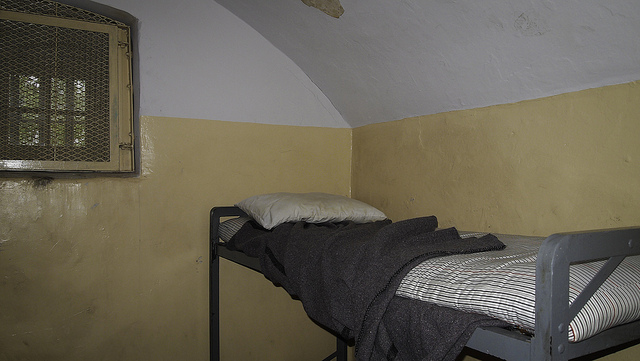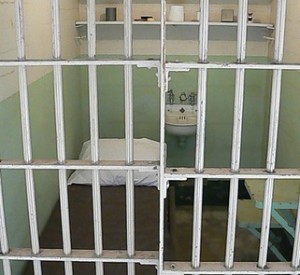Prisoner voting for the final general election before release is a solution that balances concerns about democratic rights
Democratic Audit has recently featured analysis of prisoner voting rights from several leading experts. In the second of two new contributions to this debate – following Peter Ramsay’s earlier post – Chris Bennett and Daniel Viehoff argue that both sides of the debate can make strong claims to democratic principles. They make a new proposal that aims to balance these competing concerns.

Under this proposal, prisoners serving under five years could vote in general elections. Credit: Racineur (CC BY-NC-ND 2.0)
We were recently invited to give evidence to the Joint Committee on the Draft Voting Eligibility (Prisoners) Bill. The Committee was set up to scrutinise the UK Government’s response to the repeated decisions of the European Court of Human Rights that the indiscriminate removal of the right to vote from those who receive a custodial sentence exceeds the legitimate ‘margin of appreciation’ the UK has to interpret and apply the rights asserted in the European Convention.
One thing that was clear was that the politicians are sore at having been brought to this point by political pressure from the European Court second-guessing national sovereignty. Westminster faces having to revise its treatment of prisoners or else violate the Convention, the fear being that the latter option would give succour to regimes who may want to commit more serious human rights abuses. Whatever one thinks about the sovereignty issue and the process by which this question has been put on the political agenda, however, this presents the Government with a good opportunity to set its policy on prisoner voting on a more principled footing.
Of course, practical concerns will influence the politicians’ final decision. But at the heart of the matter there are two philosophical questions: Why do we have voting rights in the first place? And how can we lose them? Having investigated these questions of principle, however, it will be important to consider a third question: what would the likely consequences be of the policy, independently of its grounding in attractive principle?
The draft Bill sets out three options: 1) leave the blanket ban on prisoner voting unchanged; 2) prisoners lose the vote when sentenced for longer than six months; or 3) prisoners lose the vote when sentenced for four years or more. We argued that only the third would be anywhere near fair. However, we don’t think democracy requires that prisoners retain the right to vote. Rather, we accept that a democratic case can be made for disenfranchising those who violate central democratic values, including respect for fellow citizens (see Peter Ramsay’s argument). These reasons for disenfranchisement need to be balanced, though, against concerns of democratic legitimacy and opportunities for rehabilitation. For this reason we proposed a fourth option: that prisoners should be able to vote in the final (general) election before their release, thus meaning, in the current scheme of things, that no one serving less than five years would lose the right to vote.
There are three main reasons why an individual or a group might have voting rights in the first place –the good of the vote-holder themselves; the good of others; or to ensure the legitimacy of the laws. Which interests of the vote-holder might be served by having the vote? Firstly, it might be an interest in exerting some measure of control, however, small, over the laws under which one lives. Or secondly, it might be an interest in being treated as a political equal in one’s community, particularly in communities where all other adults have the right to vote. Imagine a small ethnic minority have the vote removed because they never exercise it. This is to treat them as second-class citizens even if the vote never served to protect their interest in controlling the laws they live under.
If we turn, secondly, to the interests of others that are served by any individual having the vote, we argue that universal enfranchisement tends to improve the quality of the law. We all have an interest in living in a just society, under laws that reflect the legitimate interests of all relevant parties (however the relevant interests are to be determined). Universal enfranchisement makes it less likely that MPs enact unjust laws. This is partly because those whose interests will be seriously injured by a policy will likely vote against it. But more importantly, they will argue against it, and persuade other citizens to also oppose a law that they recognize as unjust. Couldn’t they argue against it even if they don’t have voting rights? Sure. But would they be listened to? MPs, and politically active citizens, have a far greater incentive to pay attention to the views of those who can vote than those who can’t. Even if one thinks that those who commit offences should suffer some punishment, prisoners, as prisoners, have legitimate interests that should be represented in the formulation of law. Enfranchisement of prisoners is the best way to do so.
Thirdly, the right to vote also plays an important role in establishing the state’s moral right to exercise power over its subjects. Historically, the liberal-democratic political tradition has focused on consent as the proper basis of the state’s legitimate authority. But as a matter of fact, very few of us have (or even could have) freely consented to the authority of our state. The opportunity for participation provided by the right to vote has been deemed a functional substitute for consent: those who have the right to vote and thus to participate in our collective decision-making may thereby have acquired a duty to obey the law, and liability to the state’s coercive power, that is (within certain limits) similar to that which would have followed from consent.
For various reasons, then, the franchise represents a weighty right that should not be taken away without important cause. Nevertheless, there are reasons in favour of removing the franchise that have to be balanced against those just given. Two types of answer are worth considering here.
A forward-looking response points to some future ill that removal of the vote serves to prevent. For instance, even fundamental rights can be removed or suspended in times of emergency, or when a person poses a significant and unavoidable danger to others. However, it is not clear that prisoners having the vote poses significant danger, or that even if it did, it would be all and only prisoners who we should disenfranchise on such grounds. Furthermore, countries like the UK eschew competency tests and operate a default universal enfranchisement. Disenfranchising on these grounds would represent a marked departure from this liberal position.
By contrast a backward-looking response points to the appropriateness of disenfranchisement as a response to the gravity of the crime itself. For instance, a backward-looking response might be the idea that disenfranchisement is a suitable form of punishment. For this argument to work, disenfranchisement would have to be linked to accepted purposes of punishment. Does it help deter crime? Only if people cared enough about losing the vote, and if it were publicised that it was lost, neither of which is the case? Does it incapacitate? Well, yes, but not in such a way as to meet conditions of necessity and proportionality. Does it rehabilitate? As Nicola Lacey argues in another Democratic Audit post on this subject, we should in fact expect the reverse: disenfranchisement can simply further alienate already marginalised groups from integration into mainstream society. Does it serve legitimate retribution? We argued that the strongest punitive justification for disenfranchisement is in fact this retributive response, and, in particular, that we should have some sympathy for the idea that distancing oneself from intolerable violations of the basic duties of citizenship (serious crimes) requires the removal of some of the basic forms of treatment citizens can normally expect. Thus we can imagine a small self-governing association finding it quite fitting to suspend the voting rights of a member who has grievously violated the duties of mutual respect that go with membership. This would be an act of inclusion rather than simple exclusion, a way of affirming that, as a member, he is held to certain standards of behaviour. By analogy, a democratic state is founded on certain values and has to hold its members accountable to treating one another in accordance with those values. Furthermore, more broadly speaking, we should support forms of punishments that are more symbolic and less directly harmful, in which case disenfranchisement may have its place.
Disenfranchisement can therefore, in some circumstances, be an appropriate vehicle for legitimate condemnation of those who have committed serious crimes. Nevertheless it also needs to be recognised that, in circumstances of inequality and social exclusion, it can also serve to communicate to already disadvantaged and marginalised people that they have no stake in the power exercised over them. Furthermore, it denies a class of citizens the ability to consent to the political power that will be exercised over them once their sentence has been served. Finding a policy on this question will therefore always be a matter of balancing and trade-offs of values. The policy suggestion we made to the Committee was that an attractive way forward is to give prisoners the right to vote in the final general election (and presumably local and European elections) before their release. That can serve rehabilitative purposes, and means that power exercised over them will be legitimate. But it will also mean that the rich symbolism of disenfranchisement can be deployed in order to mark those serious crimes that someone with the rights and competences of citizenship should never have committed.
Note: This post represents the views of the author, and does not give the position of the London School of Economics or Democratic Audit. Please read our comments policy before commenting. Shortlink: https://buff.ly/1aLECnQ.
 Chris Bennett is a Senior Lecturer in the Department of Philosophy at the University of Sheffield. His interests are in moral, political and legal philosophy. He also has interests in moral psychology and the history of philosophy. Since July 2013 he has been Editor-in-Chief of the Journal of Applied Philosophy.
Chris Bennett is a Senior Lecturer in the Department of Philosophy at the University of Sheffield. His interests are in moral, political and legal philosophy. He also has interests in moral psychology and the history of philosophy. Since July 2013 he has been Editor-in-Chief of the Journal of Applied Philosophy.
 Daniel Viehoff joined the Department of Philosophy at the University of Sheffield in 2010, after completing a PhD at Columbia University and spending a year as Faculty Fellow at Harvard University´s Safra Center for Ethics. Daniel´s research is primarily in political, moral, and legal philosophy, but he is also interested in social philosophy, philosophy of action, and the philosophy of Immanuel Kant.
Daniel Viehoff joined the Department of Philosophy at the University of Sheffield in 2010, after completing a PhD at Columbia University and spending a year as Faculty Fellow at Harvard University´s Safra Center for Ethics. Daniel´s research is primarily in political, moral, and legal philosophy, but he is also interested in social philosophy, philosophy of action, and the philosophy of Immanuel Kant.






 Democratic Audit's core funding is provided by the Joseph Rowntree Charitable Trust. Additional funding is provided by the London School of Economics.
Democratic Audit's core funding is provided by the Joseph Rowntree Charitable Trust. Additional funding is provided by the London School of Economics.
An interesting proposal, but how do we identify the final general election before their release? Not only might their release date not be certain in advance, but also general elections (in the UK) are not held at fixed intervals but called by the government.
If the next general election is in 2015, and we gave everyone due to be released by 2020 a vote in it, what would happen if there was another general election in 2017? Then some of those prisoners enfranchised in 2015 ought not to have been.
Thanks for the comment. Actually, with the passing of the Fixed Term Parliament Act in 2011, the government removed its right to call an election at a time of its choosing – at present there are mandatory five-year terms. This Act could be repealed, of course, but it does make it easier to solve this puzzle. It means that prisoners will vote in any general election that is held during the last five years of their imprisonment, since that will be the last one before their release. We also assume that it would be efficient and fair to formulate a general rule applied in the same way to all offenders. To ensure that all prisoners are given the chance to vote in the last general election before their release, the general rule formulated on this basis would have to state that any prisoner who is convicted of a sentence shorter than five years should not be disenfranchised at all.
Ah, I’d forgotten about that change. As you say, it makes things easier, but I believe that quicker elections can still occur, e.g. due to a vote of no confidence.
(I had previously thought those serving sentences shorter than five years shouldn’t be disenfranchised, but on slightly different grounds: why should your two-year sentence disenfranchise you when mine doesn’t disenfranchise me, just because of when the election falls?)